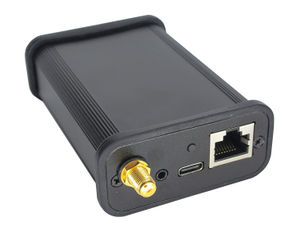Difference between revisions of "E1/T1 Interface"
(→/etc/osmocom/osmo-e1d.cfg) |
(→/etc/osmocom/osmo-e1d.cfg) |
||
| Line 44: | Line 44: | ||
usb-serial [interface serial number] | usb-serial [interface serial number] | ||
</pre> | </pre> | ||
| + | |||
| + | More information about logging section can be found [https://ftp.osmocom.org/docs/latest/osmomsc-vty-reference.pdf here] | ||
Revision as of 10:05, 6 October 2022
Contents
[hide]Why not TDMoIP / CESoIP?
Usual E1/T1 over IP protocols use generic frames over IP transfer that makes 2 megabits constant rate with up to 8000 packets per second. That approach:
- not suitable for distributed sites with limited internet access
- makes constant parasite load on the servers
- requires delays to compensate jitters
- has issues with asynchronous-to-synchronous transition
Fur such kind of integrations we prefer to have our own agent software on-site with hardware E1/T1 interfaces.
- good timings driven by E1/T1 clock or GPS
- good framing due to synchronous composition on the site
- less traffic due to transfer only valuable demultiplexed information
icE1usb
We have chosen Osmocom icE1usb as a primary interface for our projects for several reasons:
- good compatibility with big range of hardware hosts due to use USB
- in opposite to most of DAHDI interfaces it is in production
- open-source hardware design
- open-source user-space driver, no need for the kernel driver
- suitable API for our purposes
- available at Sysmocom's web shop
Driver installation
We maintained [Osmocom E1D] in our Debian repositories. It has no modifications so you can shose any source of packages you want or build from the sources.
- sudo apt install osmo-e1d
Driver configuration
/etc/osmocom/osmo-e1d.cfg
- log syslog
- logging filter all 1
- logging level e1d info
- e1d
- interface 0 icE1usb
- usb-serial [interface serial number]
More information about logging section can be found here
 BrandMeister
BrandMeister